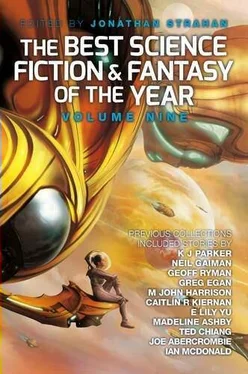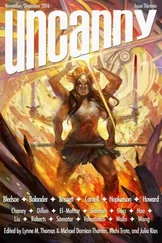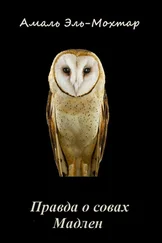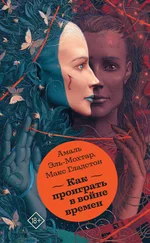Амаль Эль-Мохтар - The Truth About Owls
Здесь есть возможность читать онлайн «Амаль Эль-Мохтар - The Truth About Owls» весь текст электронной книги совершенно бесплатно (целиком полную версию без сокращений). В некоторых случаях можно слушать аудио, скачать через торрент в формате fb2 и присутствует краткое содержание. Год выпуска: 2014, Жанр: Фэнтези, на английском языке. Описание произведения, (предисловие) а так же отзывы посетителей доступны на портале библиотеки ЛибКат.
- Название:The Truth About Owls
- Автор:
- Жанр:
- Год:2014
- ISBN:нет данных
- Рейтинг книги:5 / 5. Голосов: 1
-
Избранное:Добавить в избранное
- Отзывы:
-
Ваша оценка:
- 100
- 1
- 2
- 3
- 4
- 5
The Truth About Owls: краткое содержание, описание и аннотация
Предлагаем к чтению аннотацию, описание, краткое содержание или предисловие (зависит от того, что написал сам автор книги «The Truth About Owls»). Если вы не нашли необходимую информацию о книге — напишите в комментариях, мы постараемся отыскать её.
The Truth About Owls — читать онлайн бесплатно полную книгу (весь текст) целиком
Ниже представлен текст книги, разбитый по страницам. Система сохранения места последней прочитанной страницы, позволяет с удобством читать онлайн бесплатно книгу «The Truth About Owls», без необходимости каждый раз заново искать на чём Вы остановились. Поставьте закладку, и сможете в любой момент перейти на страницу, на которой закончили чтение.
Интервал:
Закладка:
There are owls that sail through the air like great ships. There are owls that flit like finches from branch to branch. There are owls that look at you with disdain and owls that sway on the perch of your arm like a reed in the wind.
Anisa is not afraid of owls. She thinks they're interesting enough, when people aren't cooing over them or embroidering them onto cushions. From walking around the sanctuary she thinks the owl she saw as a child was probably a Eurasian Eagle Owl.
She wanders from cage to cage, environment to environment, looking at owls that bear no resemblance to the pretty patterns lining the hems of skirts and dresses — owls that lack a facial disk, owls with bulging eyes and fuzzy heads, owls the size of her palm.
Some of the owls have names distinct from their species: Hosking, Broo, Sarabi. Anisa pauses in front of a barn owl and frowns at the name. Blodeuwedd?
"Blow-due-wed," she sounds out beneath her breath, while the owl watches her.
"It's Bloh-DA-weth, actually," says a friendly voice behind her. Anisa turns to see one of the owl handlers from the flying display, a black woman named Izzy, hair wrapped up in a brightly colored scarf, moving into one of the aviaries, gloved hands clutching a feed bucket. "It means 'flower-face' in Welsh."
Anisa flushes. She looks at the owl again. She has never seen a barn owl up close, and does not think it looks like flowers; she thinks, all at the same time, that the heart-shaped face is alien and eerie and beautiful and like when you can see the moon while the sun is setting, and that there should be a single word for the color of the wings that's like the sheen of a pearl but not the pearl itself.
She asks, "Is it a boy or a girl?"
"Do you not know the story of Blodeuwedd?" Izzy smiles. "She was a beautiful woman, made of flowers, who was turned into an owl."
Anisa frowns. "That doesn't make sense."
"It's from a book of fairytales called The Mabinogion —not big on sense-making." Izzy chuckles. "I don't think she likes it either, to be honest. She's one of our most difficult birds. But she came to us from Wales, so we gave her a Welsh name."
Anisa looks into Blodeuwedd's eyes. They are blacker than her own.
"I like her," she declares.
A group of owls is called a Parliament.
Owls are bad luck.
The summer Anisa saw the owl kill the rooster was the summer Israel bombed the country. She always thinks of it that way, not as a war — she doesn't remember a war. She never saw anyone fighting. She remembers a sound she felt more than heard, a thud that shook the earth and rattled up through her bones — then another — then a smell like chalk — before being swept into her father's arms and taken down into shelter.
She remembers feeling cold; she remembers, afterwards, anger, weeping, conversations half-heard from her bed, her mother's voice reaching them in sobs from London, robotic and strangled over a poor internet connection, a mixing of English and Arabic, accents swapping places. Her father's voice always calm, measured, but with a tension running through it like when her cousin put a wire through a dead frog's leg to make it twitch.
She remembers asking her grandmother if Israel attacked because of the owl. Her grandmother laughed in a way that made Anisa feel hollow and lost.
"Shh, shh, don't tell Israel! An owl killed a rooster — that's more reason to attack! An owl killed a rooster in Lebanon and the government let it happen! Quick, get off the bridges!"
The whole family laughed. Anisa was terrified, and told no one.
Why did the owl not go courting in the rain? Because it was too wet to woo.
"What makes her 'difficult'?" asks Anisa, watching Blodeuwedd sway on her perch. Izzy looks fondly at the owl.
"Well, we acquired her as a potential display bird, but she just doesn't take well to training — she hisses at most of the handlers when they pass by, tries to bite. She's also very territorial, and won't tolerate the presence of male birds, so we can't use her for breeding." Izzy offers Blodeuwedd a strip of raw chicken, which she gulps down serenely.
"But she likes you," Anisa observes. Izzy smiles ruefully.
"I'm not one of her trainers. It's easy to like people who ask nothing of you." Izzy pauses, eyes Blodeuwedd with exaggerated care. "Or at least, it's easy to not hate them."
Before Anisa leaves with the rest of her class, Izzy writes down Mabinogion for her on a piece of paper, a rather deft doodle of an owl's face inside a five-petaled flower, and an invitation to come again.
Most owls are sexually dimorphic: the female is usually larger, stronger, and more brightly colored than the male.
Anisa's mother is tall, and fair, and Anisa looks nothing like her. Her mother's brown hair is light and thin and straight; her mother's skin is pale. Anisa is used to people making assumptions— are you adopted? Is that your stepmother? — when they see them together, but her mother's new job at the university has made outings together rare. In fact, since moving to Glasgow, Anisa hardly sees her at home anymore, since she has evening classes and departmental responsibilities.
"What are you reading?" asks her mother, shrugging on her coat after a hurried dinner together.
Anisa, legs folded up underneath her on the couch, holds up a library copy of The Mabinogion . Her mother looks confused, but nods, wishes her a good night, and leaves.
Anisa reads about how Math, son of Mathonwy, gathered the blossoms of oak, of broom, of meadowsweet, and shaped them into a woman. She wonders, idly, what kind of flowers could be combined to make her.
There are owls on every continent in the world except Antarctica.
The so-called war lasted just over a month; Anisa learned the word "ceasefire" in August. Her father put her on a plane to London the moment the airports were repaired.
Before she started going to school, Anisa's mother took her aside. "When people ask you where you're from," she told her, "you say 'England,' all right? You were born here. You have every bit as much right to be here as anyone else."
"Baba wasn't born here." She felt a stinging in her throat and eyes, a pain of unfair . "Is that why he's not here? Is he not allowed to come?"
Anisa doesn't remember what her mother said. She must have said something. Whatever it was, it was certainly not that she wouldn't see her father in person for three years.
The Welsh word for owl once meant "flower-face".
When Izzy said Blodeuwedd was made of flowers, Anisa had imagined roses and lilies, flowers she was forced to read about over and over in books of English literature. But as she reads, she finds that even Blodeuwedd's flower names are strange to her — what kind of a flower is "broom"? — and she likes that, likes that no part of Blodeuwedd is familiar or expected.
Anisa has started teaching herself Welsh, mostly because she wants to know how all the names in the Mabinogion are pronounced. She likes that there is a language that looks like English but sounds like Arabic; she likes that there is no one teaching it to her, or commenting on her accent, or asking her how to speak it for their amusement. She likes that a single "f" is pronounced "v", that "w" is a vowel — likes that it's an alphabet of secrets hidden in plain sight.
She starts visiting the owl centre every weekend, feeling like she's done her homework if she can share a new bit of Mabinogion trivia with Izzy and Blodeuwedd in exchange for a fact about owls.
Читать дальшеИнтервал:
Закладка:
Похожие книги на «The Truth About Owls»
Представляем Вашему вниманию похожие книги на «The Truth About Owls» списком для выбора. Мы отобрали схожую по названию и смыслу литературу в надежде предоставить читателям больше вариантов отыскать новые, интересные, ещё непрочитанные произведения.
Обсуждение, отзывы о книге «The Truth About Owls» и просто собственные мнения читателей. Оставьте ваши комментарии, напишите, что Вы думаете о произведении, его смысле или главных героях. Укажите что конкретно понравилось, а что нет, и почему Вы так считаете.












